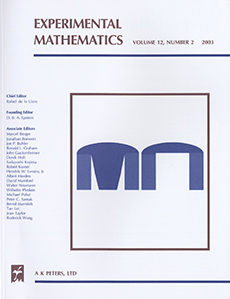Abstract
We investigate the problem of computing tensor product multiplicities for complex semisimple Lie algebras. Even though computing these numbers is {\small $\#P$}-hard in general, we show that when the rank of the Lie algebra is assumed fixed, then there is a polynomial-time algorithm, based on counting lattice points in polytopes. In fact, for Lie algebras of type {\small $A$}, there is an algorithm, based on the ellipsoid algorithm, to decide when the coefficients are nonzero in polynomial time for arbitrary rank. Our experiments show that the lattice point algorithm is superior in practice to the standard techniques for computing multiplicities when the weights have large entries but small rank. Using an implementation of this algorithm, we provide experimental evidence for two conjectured generalizations of the saturation property of Littlewood-Richardson coefficients. One of these conjectures seems to be valid for types {\small $B$}, {\small $C$}, and {\small $D$}.
Citation
Jesús A. De Loera. Tyrrell B. McAllister. "On the Computation of Clebsch-Gordan Coefficients and the Dilation Effect." Experiment. Math. 15 (1) 7 - 19, 2006.
Information




